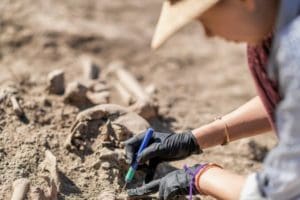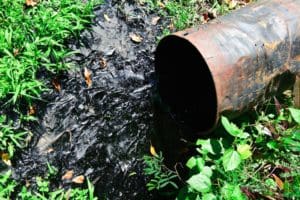Native Cases in the Supreme Court
There are several cases involving tribes that are going before the Supreme Court this year: Haaland v. Brackeen, which is scheduled for 2023, and Arizona v. Navajo Nation, which will be heard on March 20, 2023.
Haaland v. Brackeen has been brought by the states of Texas, Louisiana, and Indiana, and individual plaintiffs, and seeks to declare the Indian Child Welfare Act (ICWA) unconstitutional. The case was argued before the Supreme Court on November 9, 2022, and a decision was expected in spring 2023.
The ICWA was enacted in 1978 to protect American Indian children from removal from their tribes to be adopted by non-Indians. The law sets federal standards for the out-of-home placement of American Indian children and requires caseworkers to make “active efforts” to keep Native children with their biological family.
Arizona v. Navajo Nation is a case that asks the Supreme Court to consider whether there is a trust relationship between the Navajo Nation and the U.S. government regarding the Nation’s water rights. The case was heard by the Supreme Court on March 20.
The outcome of this case will have far-reaching implications for the Navajo Nation’s water resources, the stability of water rights, and the water allocation system. The case pits the treaty rights of the largest Native American reservation in the United States against water-rights claims by the state in which much of the reservation is located.
 Protecting Native Burial Sites
Protecting Native Burial Sites
New York is one of four states without statutory protection for American Indian burial sites, but that is set to change thanks to a provision included in the state budget deal announced in early May. The measure would, for the first time, require private landowners to halt development if they discover a burial site on their property, and make it a crime to remove, deface or sell the remains or funerary objects.
Representatives of the state’s tribes had pushed legislators to protect the graves of their ancestors for almost 20 years, only to see bills die without getting to a vote. When a grave protection bill finally passed last year with unanimous approval, Governor Kathy Hochul vetoed it, saying it stripped landowners of their property rights.
The veto drew harsh criticism from tribal leaders and their backers, who blamed powerful business and real estate interests for the repeated failures to pass the legislation.
Under the measure being considered, landowners would have to call the county medical examiner or coroner if human remains are discovered on their property. If the authorities find the remains are of ancient Native American origin, a burial site committee of tribal representatives and state experts would examine the case and decide, together with the landowner and descendants of the dead, what to do next.
Differences over what should happen when the landowner and the descendants disagree, including the prospect of delays, led to Hochul’s veto. After the veto last year, Hochul said she would seek to balance grave protection with property rights. The new law now heads to her desk.
 Tribe Fears Oil Spill
Tribe Fears Oil Spill
The Bad River Band of Lake Superior Chippewa in Wisconsin have asked U.S. District Judge William Conley to issue an emergency ruling forcing energy company Enbridge to shut down the Line 5 pipeline after large chunks of riverbank running alongside it were washed away by the river in northern Wisconsin. The tribe is concerned an Enbridge oil pipeline will cause a massive oil spill due to erosion and proximity to a river.
The tribe says less than 15 feet of land now stands between the Bad River and Line 5 in four locations on the reservation. In some places, more than 20 feet of riverbank has eroded in the past month alone. Experts and environmental advocates have warned in court that an exposed section of pipeline would be weakened and could rupture at any time, causing massive oil spills.
Enbridge’s engineers argue that the pipeline will not be exposed to erosion, let alone rupture, in the next year.
The Bad River tribe sued Enbridge in 2019 to force the company to remove the roughly 12-mile section of Line 5 that crosses tribal lands, saying that the 70-year-old pipeline is dangerous and that land agreements allowing Enbridge to operate on the reservation expired in 2013.
Conley sided with the tribe last September, saying Enbridge was trespassing on the reservation and must compensate the tribe for illegally using its land. But he wouldn’t order Enbridge to remove the pipeline due to concerns about what a shutdown might do to the economy of the Great Lakes region.
 Native Students Sue for Tribal Regalia
Native Students Sue for Tribal Regalia
On May 15 a Native high school graduate in Oklahoma sued a school district, claiming she was forced her to remove a feather from her cap at a ceremony last spring. Groups like the Native American Rights Fund regularly hear from students blocked from wearing eagle feathers or other regalia.
A bill vetoed earlier this month by Oklahoma Governor Kevin Stitt, a Republican, would have allowed the student and others like her to wear feathers, beaded caps, stoles or other objects of cultural and religious significance. Advocates argued laws are needed to avoid leaving it up to individual high school administrators. On May 25, the Oklahoma Legislature overrode Stitt’s veto.
The measure takes effect July 1 and has strong support from many Oklahoma-based tribes and Native citizens. It would allow any student at a public school, including colleges, universities and technology centers, to wear tribal regalia such as traditional garments, jewelry or other adornments during official graduation ceremonies.
For Native students, tribal regalia is often passed down through generations and worn at graduations to signify connection with the community. Disputes over such attire have spurred laws making it illegal to prevent Native students from wearing regalia in nearly a dozen states including Arizona, Oregon, South Dakota, North Dakota and Washington.
Leave a Reply